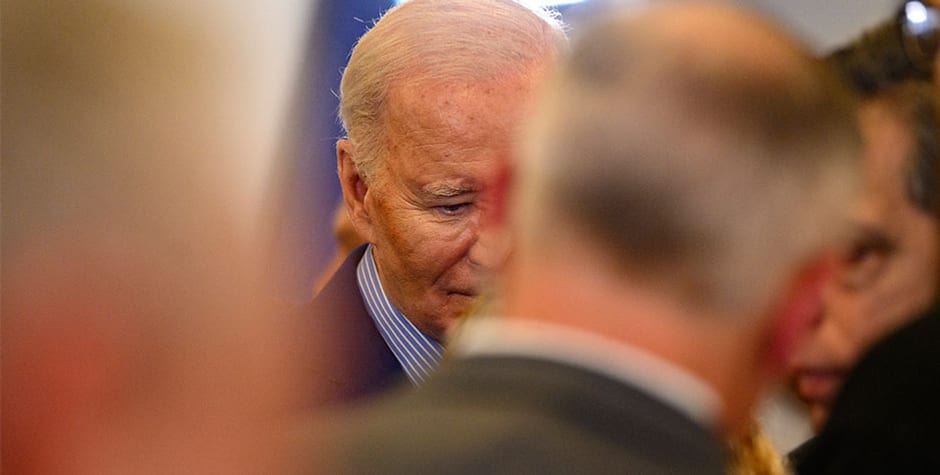FOIA Bombshell: Leading NGO Network Warned Biden State Department That Afghanistan Withdrawal Would Lead To “Great Power Competition With China and Russia and Interference by Iran To . . . Undermine U.S. Strategic and Security Interests”
Previously, we told you we had filed a Freedom of Information Act (FOIA) and then sued the U.S. State Department for answers regarding the botched withdrawal in Afghanistan. Well, document production has started (the entire month’s production is available here), and we came across a very telling letter by a leading NGO network to the State Department from August 1, 2021, regarding the projected outcome of the final U.S. withdrawal on August 30, 2021.
The NGO network warned the State Department that if it did not change course, the U.S. withdrawal from Afghanistan would lead to a “great power competition with China and Russia and interference by Iran to exert nefarious influence in the region and undermine U.S. strategic and security interests.”
Let that sink in. Since Biden’s Afghanistan debacle, each of those warnings has come to pass. China is saber-rattling with Taiwan, Russia has invaded Ukraine, and Iran has directly attacked America’s key ally in the Middle East – Israel. And now we know that the State Department was directly warned.
The letter was attached to an email that begins:
The Alliance for Peacebuilding (AfP)—the leading nonpartisan global network of 150+ member organizations working in 181 countries to end violent conflict and build sustainable peace—and the 37 undersigned organizations urge the U.S. Department of State and USAID to immediately articulate a comprehensive diplomatic, development, peacebuilding, and humanitarian strategy for Afghanistan. Attached and below please find a letter outlining recommendations for a long-term strategic vision to prevent the increasingly deteriorating security situation from further devolving into intractable violent conflict.
In the body of the letter, the group first makes recommendations for avoiding (the future) disaster in Afghanistan. It proposes:
Encouraging a multi-stakeholder process through the UN, or other neutral institution, with buy-in from NATO allies, regional neighbors, and other key interested parties.
Appointing a neutral mediator to prioritize key issues other than power-sharing, such as disarmament, demilitarization, and reintegration and transitional justice.
Continuing to support the internationally-recognized and constitutionally- elected Afghan government and utilizing all available resources to give it the best negotiating position.
Working with Afghan and international partners to ensure a long-term ceasefire and violence de-escalation, as well as advancing confidence-building measures, such as a joint de-escalation committee to investigate violence on the ground.
Pressuring the Qataris to close their local office, should the Doha process continue, if the Taliban refuses to institute a long-term ceasefire and continues to target Afghan civilians.
Stopping efforts at the UN to de-list Taliban members from the UN Terror List or relax sanctions, adding additional Taliban members to sanctions lists, refusing to release Taliban prisoners, withholding aid, and ensuring the Taliban’s international pariah status.
The analysis makes statements that are eerily prescient, for example:
The return of Taliban rule gravely threatens Afghan civilians, especially women and girls. The State Department and USAID must ensure women’s meaningful and equal participation in Afghan society and the peace process as required by the Women, Peace, and Security (WPS) Act of 2017, the 2019 WPS Strategy, and its agency implementation plans. Over the last 20 years, women and girls in Afghanistan have made extraordinary progress after life under the harsh Taliban regime. . . . The return of Taliban rule gravely threatens Afghan women and girls, as well as youth, civil society, and minorities such as the Hazaras.
Finally, there is this statement:
Failing to accompany the military withdrawal with the aforementioned engagement will not only undo the hard-fought gains made in Afghanistan during the last 20 years, but will also create newfound costs through a security vacuum, the country’s return to an extremist safe haven, a new refugee crisis, and widespread regional and global instability. U.S. disengagement will create space for great power competition with China and Russia and interference by Iran to exert nefarious influence in the region and undermine U.S. strategic and security interests. Preventing these outcomes is more than a moral goal; it will actively promote U.S. national and international security. As the clock runs out on the U.S. security presence in Afghanistan, the time is now for the U.S. to articulate a long-term strategy that identifies how sustained U.S. engagement will protect against protracted violent conflict, a refugee crisis, and regional destabilization, while promoting national security and strategic interests.
The Deep State keeps racking up “wins” like the Afghanistan debacle, but we now know that they were warned. The foreign policy chaos we’ve witnessed under Biden’s watch could have been avoided. The ACLJ will keep you informed as we find other documents of interest. We will continue to hold the Deep State accountable.
